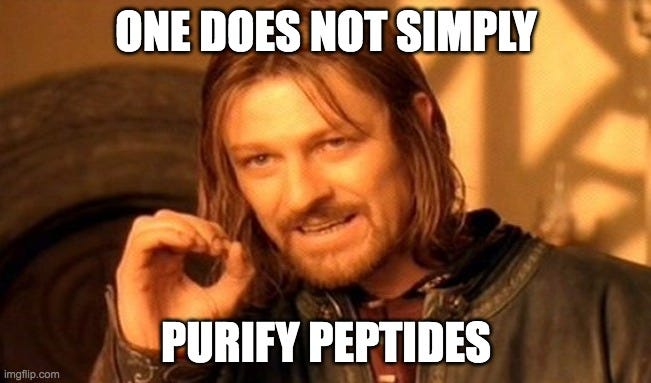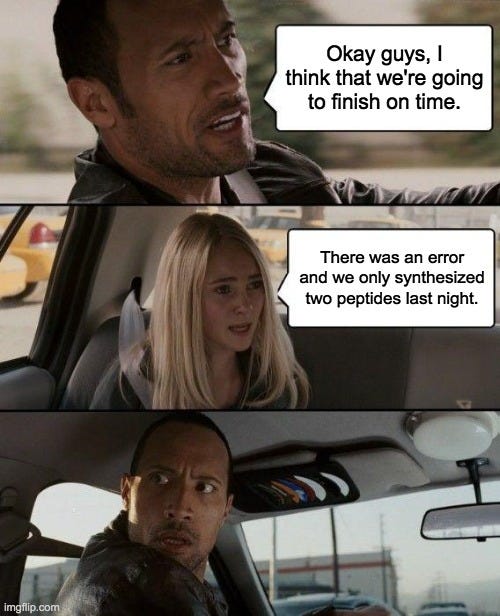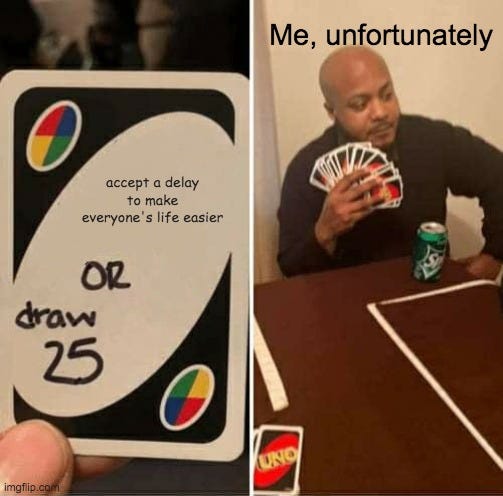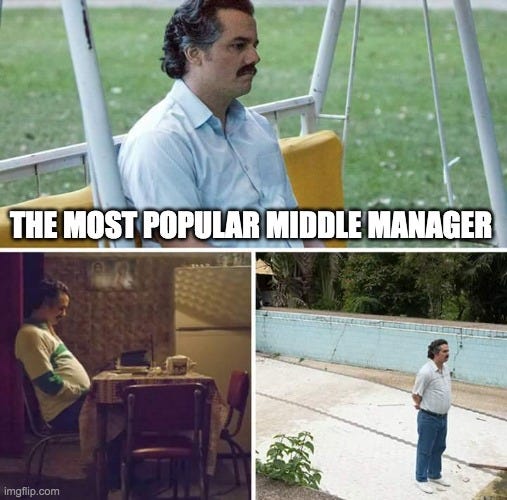When I worked at Mytide Therapeutics, I was the “peptide purification” guy. We had a machine that synthesized peptides, or short-chain proteins, by mixing various chemicals. We had another machine used to purify the synthesized peptide - basically, to extract the correct material and throw out the incorrect material.
My job was challenging because it combined chemistry knowledge with engineering skills. In order to operate the purifier, I needed to be able to dissolve the peptides correctly and control the purifier settings (normal chemistry stuff). However, I also had to troubleshoot software and hardware when things like robotic arm crashes happened. Even logistics like replacing solvents and supplies and maintaining inventory were part of my daily tasks.
Over time, I figured out systems and mastered the machine, and we began to look to hire someone I could train to take over my duties.1
The first trainee, Jonathan, was fine. He worked hard, but he struggled to keep all the different tasks organized, and the software piece went way over his head. He became more of an assistant who made my life easier, rather than my replacement.
The next hire, Bill, was truly terrible. He had a PhD in chemistry, and I think he resented the fact that a 24-year old kid with a Bachelor’s was teaching him how to operate a purifier. Bill was rude, didn’t really seem to care about meeting the team’s timelines, and was happy to push work off to me. The truth was that this job was as much about manufacturing as it was about chemistry, and he didn’t enjoy that.2
Finally, we hired Rachel, and she was excellent. Rachel had just graduated, but she was a fast learner and a hard worker. Even though so much of the job was brand new, she kept at it, asked questions, and fully replaced me in the lab after about 3 months. Even better, we were friends after all the time together in the lab. She even came to my birthday party!
During the last few weeks I was in the lab, we had to complete an order. A customer wanted us to make small amounts of about 200 peptides in about 3 weeks, which resulted in us working up to the day before Christmas Eve, through weekends, in order to finish on time. Tensions ran high for everyone in the lab; we were sick of each other, sick of the long hours, and just wanted to go on vacation.
The bright side was that, when we came back in the new year, I had “graduated” to my next role of managing the whole manufacturing process. Whenever we had a new order, I was going to be the one who mapped out the peptides that needed to be made, figured out the order in which they should be produced based on the likelihood of success, and monitored production on a daily basis to makes sure we stuck to the plan. It was a cool role, and it was exciting for Rachel and the others in the lab to have more independence.
Unfortunately, I kind of ruined it.
The orders I was asked to coordinate were just barely possible, often requiring that we were able to run our systems 20+ hours a day for two weeks. If we ran into issues due to a hardware failure or a manufacturing error, I had to figure out how to fit a solution into our timeline. As the person responsible for delivering the orders on time, these tight parameters stressed me out a lot.
As a result, over a few months, my working relationship with Rachel (and the others in the lab) mostly soured. I believe that there were three core factors involved:
There were several members of the team who really weren’t carrying their weight, so, more than my help in the lab, I’m pretty sure that Rachel and the others wanted me to confront the less impactful workers. Of course, I chose to take the path of least resistance, leaning heavily on our best workers and pushing them to put in the long, long hours required to meet our timelines. I was there with them, but I doubt that made things much better.
I was often far too fast to offer help. I was so anxious about things going off the rails that I was over-communicating, which my colleagues took as a lack of trust. In the moment, I saw it as my job to stay on top of our processes. Realistically, the truth was somewhere in the middle: people don’t love when their work is questioned, but they can tolerate it if they feel like they are being respected and valued.
The nail in the coffin was that I still wanted to be friends with Rachel and for all my colleagues in the lab to like me. I think that would’ve been possible if I was just a bit pushy, but when you add in the perceived lack of trust from #2, my friendliness probably just came off as me being condescending or annoying.
My current opinions is that the only way you’re going to be a manager who is liked all the time is if you’re kind, patient, trusting, and encouraging. If someone is going to fail or miss a deadline, you’d probably have to pick up that slack yourself. You have to respect that people have their own obligations and priorities and accept wherever they place their role. All of this is very hard for me; I give my all to my commitments, and I tend to assume the same of others, so I tend to come off as “abrasive” and “generally not chill”.3
If you can be the laid back manager, good for you (seriously!). That’s worlds better than a pushy micro-manager who makes sure that shit gets done and doesn’t care what their subordinates think of them.
I strive for a middle ground, although I think that I probably always end up coming off pushier than I’d like. My ideal middle ground looks something like this:
The manager sets the example by being the hardest worker. There should be no doubt that they put in at least as much time as they ask of their subordinates.
The manager should default to kindness, trust, and patience, leaving people the room to fail and learn whenever possible.
The manager should also pick and choose the moments when shit gets real and being liked takes a bit of a backseat. They have to be able to have the tough conversations to make sure that the team meets its goals as a collective.
A lot of this sounds obvious, but, speaking from experience, it’s incredibly difficult to put in practice. The main reason is that these relationships don’t exist in a vacuum. At the end of the day, you’re going to have your own bosses to answer to and your own goals to meet, and it’s very easy to get lost in the sauce and de-prioritize the key people making all of the accomplishments possible.
As a manager, the best strategy I found was to reflect frequently and to protect the team whenever possible. Even if they were unhappy with me personally, I tried my best to make sure that they were appreciated by the company and given the tools they needed to succeed.
What’s interesting is that all of our bosses go through the same struggles, to an extent. Some of them may not care if they’re liked. Others may care too much. But all of them have to find ways to produce results, so that they don’t have to take responsibility for failures when reporting back to their own bosses.
Even so, compassionate, reliable leadership might be hard as hell to achieve, but it should still be a standard. All of us might stumble or struggle to relate to each other or just be plain awkward, but, at the very least, we owe it to each other to operate in good faith.
All of the following names are fake.
Bill was fired after about 6 months, which was about 4 months too long.
Nadia said that she thought I was not Type A the other day. At least when it comes to work, I’m Type AAAA.






Man, that guy really made you foot the Bill, huh? Not great when you're out here tryna Billd relationships. Must have been an Inherited Bil, rather than a hard-earned one. I guess you're just Billt different.